|

David Hardy recalls
A SUPREME SACRIFICE WHICH BROUGHT
LASTING FREEDOM
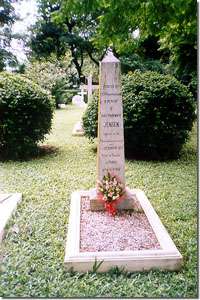 "JENSEN,
Capt. Hans Markward (Danish). Born 1878, died 14 October, 1902 aged 24,
killed in action. Seconded from the Danish army, he was a captain in
the Thai Provincial Gendarmerie, a corps of military police raised in 1897
to keep the peace in rural areas. In 1902 the Shans rebelled; they were
immigrants from Burma long settled in the north mainly as mining labour,
the alleged causes of their rebellion being government oppression. "JENSEN,
Capt. Hans Markward (Danish). Born 1878, died 14 October, 1902 aged 24,
killed in action. Seconded from the Danish army, he was a captain in
the Thai Provincial Gendarmerie, a corps of military police raised in 1897
to keep the peace in rural areas. In 1902 the Shans rebelled; they were
immigrants from Burma long settled in the north mainly as mining labour,
the alleged causes of their rebellion being government oppression.
They attacked Phrae which was undefended, beheaded the Thai Governor,
sacked the town, and marched on Lampang where Captain Jensen was in command.
He successfully beat off the rebels but was killed leading his men in pursuit
at Phayao.
For his action at Lampang he was awarded by King Chulalongkorn immediate
promotion to Major and a reward of baht 10,000; he died before he could
receive either, but his widowed mother thereupon received a Thai Government
pension of Baht 3,000 until her death in 1938. His gravestone is an obelisk,
also a gift of Chulalongkorn. There is also a memorial to him near Phayao
where he died."
The extract above from 'De Mortuis, the Story of the Chiang Mai Foreign
Cemetery', briefly tells the stark story of an outstanding young soldier
who could never have realised that the then King of Thailand - and history
- would judge his final days as crucial in the continuing independence
of this part of the nation.
Why? To understand better the significance of the drama played out in
this region 100 years ago this month, let us first look at the events leading
up to Jensen's heroic struggle - and some of the other leading players
in this brief but vitally important conflict.
A highly unpopular new poll tax levied on all the inhabitants of this
area, and on the immigrant Shan labourers, had to be collected by village
headmen. The "rebellion" began when a group of Shans waylaid
a headman carrying 1,000 baht somewhere near Lampang, stole the money and
fled into the hills. A force of around 100 police and soldiers were sent
after them, but were attacked while in camp at night. The survivors fled,
leaving behind arms, ammunition, elephants and mules, much to the delight
of the rebels (also known as dacoits).
Two days later, July 25th, 1902, better armed and with excellent transportation,
some 150 Shans attacked the town of Phrae, killed all the police, beheaded
the Governor and opened the gates of the prison. After robbing a safe at
the courthouse, the courage of the raiders was further boosted by a short
break at the local distillery (reported Chiangmai archivist and author
Roy Hudson in his 1978 account in the 'Bangkok Post').
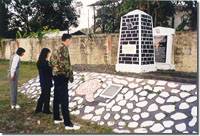
The memorial 11 kms
south of Phayao where Jensen fell.
The Shan leader, Nai Paka Mong, took some of his men on a courtesy call
to the local Prince, with whom they had no argument, left 100 men to guard
Phrae, then marched towards Lampang with swelled ranks of some 200 well
armed men. It was clear to all concerned that they fully intended to take
over the whole north west of Thailand and establish a Shan state.
Little did they know that a certain young Danish Captain had just arrived
there from Chiangmai! The wise King Chulalongkorn had realised earlier
that his northern forces needed training and qualified leadership to defend
the realm against the territorial ambitions of the French, who controlled
what is now Laos to the north, and the British who controlled Burma to
the west. The Danes, with no particularly close links back in Europe to
either predatory nation, were ideal!
Many young Danish officers were seconded to the provincial 'gendarmes'
and Captain Jensen found himself in charge of 5 officers, 127 NCO's and
80 soldiers. Also on hand, working in his teak business, was none other
than Major Louis T.Leonowens, son of Anna of the legendary 'King and I'
story, and a close friend of the King. On hearing of the approaching force,
Leonowens, then aged about 47, had already evacuated the women and children
and built barricades, one of which was manned by Jensen and 18 soldiers.
"As the attacking Shans approached, Jensen picked them off one
by one" wrote Hudson, the other men simply re-loading rifles and passing
them to him. Some 26 Shans already in the Lampang jail were beheaded by
the local Prince as a warning, and the force withdrew for a while.
Jensen received orders to escort the Prince to safety in Chiangmai and
Leonowens accompanied them. But after only one day's march they received
news that panic had broken out in Lampang at their absence.The Prince insisted
on returning with Jensen, while Leonowens continued to Chiangmai to collect
more ammunition. This proved to be an excellent decision. Confidence in
Lampang was immediately restored, only to be shattered again at the rumour
that 700 Shans were approaching. This led to a mass desertion of the defenders
and Jensen had to ride out in pursuit and bring them back!
On August 20th a relief force arrived led by a Thai Field Marshal and
a Colonel, so by October Lampang was secure and Jensen decided to take
the fight to the enemy.
A force of almost 300 men set out for Phayao but, south of the town,
another officer felt the men needed rest, so Jensen continued with a party
of only 24.
|
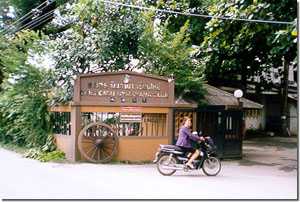
'De Mortuis: the Story of the
Chiang Mai Foreign Cemetery' by R.W.Wood is available from Chiengmai
Gymkhana Club (above) which borders the cemetery. Leonowens and Lyle were
founding members of the Club just 4 years prior to the rebellion. Our thanks
are due to Mr. Wood, to Roy Hudson for permission to use
extracts from "Hans Jensen - Hero of Thailand", 'Bangkok Post',
May 21, 1978, and Jakob Nielsen, First Secretary, Royal Danish Embassy,
Bangkok, for the only known authentic surviving photo of Captain Jensen.
|
This was perhaps his only poor decision of the campaign - and it proved
to be his last. Eleven kilometres from the town, the small party found
Shans in a gully across a stream. Shots were exchanged, Jensen was hit
3 times in the side, and fell dead. Strangely, a conflicting report said
that he had been shot in the back.
Short of ammunition, the Lampang party retreated without their leader's
body, and it was retrieved the next day. The lone hero from the other side
of the planet was buried with full military honours in the cemetery of
the American Mission in Lampang. Later, the memorial to Captain Jensen
was established in Chiangmai.
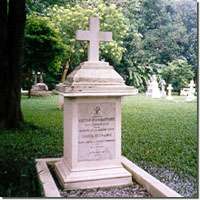 LUGAN,
Hector Jean-Baptiste (French) Born 1858, died 13 November, 1915 aged
57, Chevalier Legion d'Honneur. He came to Thailand in 1897 and was French
Consul at Nan until 1914 when he was posted Consul in Chiangmai. After
the Shan rebellion of 1902 he expressed an opinion (not as far as is known
diplomatically confirmed) that had the Shans taken Lampang, British
Indian troops would probably have occupied Chiangmai, which would have
led to the division of North Thailand between Britain and France. Editor's
note: Other sources agree, and add that the French would have been most
likely to follow the Shans south from Laos. LUGAN,
Hector Jean-Baptiste (French) Born 1858, died 13 November, 1915 aged
57, Chevalier Legion d'Honneur. He came to Thailand in 1897 and was French
Consul at Nan until 1914 when he was posted Consul in Chiangmai. After
the Shan rebellion of 1902 he expressed an opinion (not as far as is known
diplomatically confirmed) that had the Shans taken Lampang, British
Indian troops would probably have occupied Chiangmai, which would have
led to the division of North Thailand between Britain and France. Editor's
note: Other sources agree, and add that the French would have been most
likely to follow the Shans south from Laos. |
The British Vice-Consul of Nan, like Leonowens, also comes out of this
tale with great honour. Mr.T.H.Lyle, only just over 5ft tall and in poor
health, left the safety of Chiangmai and travelled to Lampang and Phrae
to single handedly negotiate with the Shans who, being Burmese, were actually
British subjects. He bravely persuaded many of them to give up their arms
and return to Burma, turning down their plea for Britain to take over the
north and make it their new home. He left Chiangmai in 1913 and was later
knighted.
JUST LIKE THE REAL THING?

Almost! The Spitfire Mk V111 in RAAF livery (no red to avoid confusion with the enemy by ground gunners), arguably the best looking piston-engined plane ever! Framed in dark Thai timber, each piece is numbered and only 1000 pieces
will ever be produced. Made by Thai craftsmen with care.
Measurement: 24 x 15 x 3.5 cm
email: gmorning@chiangmai-online.com
PRICE: 1000 BAHT

PAYMENT CAN BE MADE ONLINE
VISA & MASTER CARD WELCOME
|
FOR REMEMBRANCE
The bugler from Gavila Barracks sounds 'The Last Post' at the annual
gathering in the cemetery.
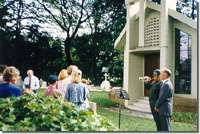
The 11th hour of the 11th day of the 11th month is the time each year
when much of Europe recalls the end of World War 1 and prays for peace.
A Remembrance Day gathering is held annually at the Chiangmai Foreign Cemetery
from 10.45am every November 11th and all nationalities and denominations
are welcome there next month.
This is also a good opportunity to view the memorial to our front cover
hero, Captain Jensen, and the nearby grave of the French Consul whose comments
underline Jensen's achievement. Ideally, purchase 'De
Mortius' from the nearby Gymkhana Club and use it as your guide
to this unique and fascinating little piece of Thailand.
(Also, see My
Chiangmai).
About the cemetery
Located to the east of Old Lamphun Road, the site of the Chiang Mai
Foreign Cemetery was given under a Royal Deed of Gift by King Chulalongkorn
on July 14th, 1898.
It is managed by a local committee and under the custodianship of the
British Consul, Bangkok, and maintained solely by voluntary contributions.
Only foreigners may be buried here, but Thais who have taken a foreign
nationality are eligible, such as Mrs Boon Wood (nee
Panya Chitpreecha) who took British nationality and is buried in the small
chapel next to her husband, William Alfred Rae Wood, author of the delightful
book 'Consul in Paradise'. Cemetery
fees are 10,000 baht for a full plot and 5,000b for an urn plot. Expatriates
often remark wryly that this is the only easy way to buy land in Thailand…..
 David
Hardy David
Hardy
|
. |


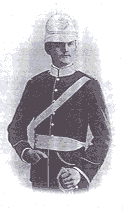
 A
supreme sacrifice which brought lasting freedom A
supreme sacrifice which brought lasting freedom
100 years ago, did this brave young Dane save Northern Thailand?
 Remembering
countless other casualties Remembering
countless other casualties
David Hardy

 Boat
racing on the mighty Mekong Boat
racing on the mighty Mekong
Riverbank Stone

 Chiangmai
and the North Chiangmai
and the North

 My
Chiangmai My
Chiangmai
David Hardy
 Chiangmai
Pool League Chiangmai
Pool League
Night Fowl
 Reasons
to Relax Reasons
to Relax
Ric Klein
Ric Klein learned more about his own city by guiding
visitors.
 The
Drinks Page The
Drinks Page
Night Fowl
 Letters Letters

 ALASKAN CAN JOB SCAM ALASKAN CAN JOB SCAM
If you hear someone promoting work in an Alaskan fish
canning factory, tell them to can it! Scammers are "recruiting"
Thais to work a 2 year contract at US$7 per hour. (...).
 Click
here to subscribe to the printed edition! Click
here to subscribe to the printed edition!

|